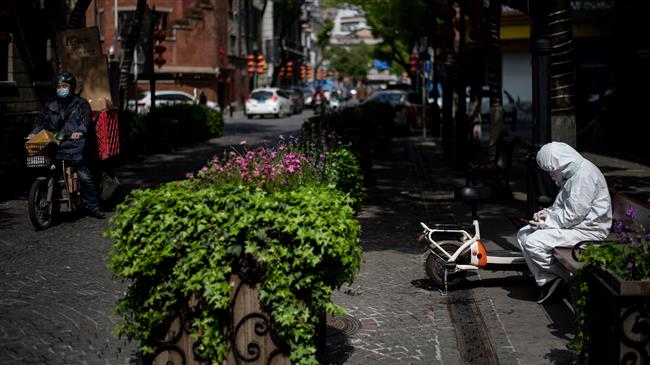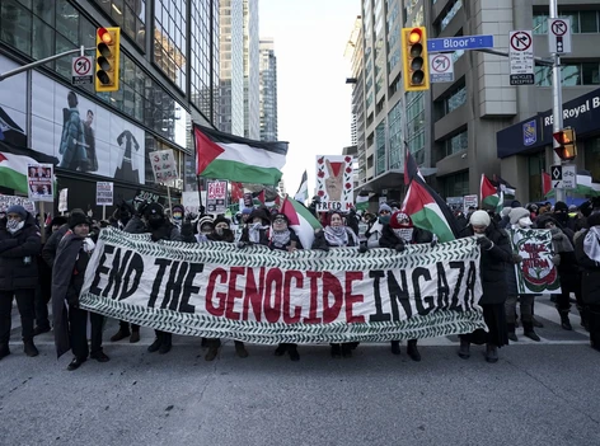
A woman wearing a hazmat suit uses her mobile phone while a man passes on a motorbike along a street in Wuhan, China, on April 1, 2020. (Photo by AFP)
The coronavirus pandemic has now claimed the lives of 42,151 people and infected 858,875 others worldwide, according to data compiled by Johns Hopkins University.
The virus has also sparked economic and social shockwaves unseen since World War II, according to the United Nations (UN).
This has prompted the World Bank to warn of significant economic pain across the globe.
The following is the latest on how the pandemic has been affecting the world in the past 24 hours.
‘The worst global crisis since WW II’
UN Secretary-General Antonio Guterres described the coronavirus outbreak on Tuesday as the worst global crisis since World War II, warning that it could trigger conflicts around the world.
He said that the large magnitude of the crisis was due to a disease that represents a threat to everybody in the world and... an economic impact that will bring a recession that probably has no parallel in the recent past.
A stronger and more effective response... is only possible in solidarity if everybody comes together and if we forget political games and understand that it is humankind that is at stake, Guterres said.
Protect global food supply chains: WTO, UN agencies
The heads of the World Trade Organization (WTO) and UN food and health agencies said on Tuesday that food supply chains must be protected from any trade-related measures.
Uncertainty about food availability can spark a wave of export restrictions, creating a shortage on the global market, WTO Director-General Roberto Azevedo and the heads of World Health Organization Tedros Adhanom Ghebreyesus and the UN’s Food and Agriculture Organization Qu Dongyu said in a joint statement.
Such reactions can alter the balance between food supply and demand, resulting in price spikes and increased price volatility, they warned.
Last week, Azevedo said that according to WTO projections, the economic downturn and job losses caused by the pandemic would be worse than the 2008 recession.
Japan on the brink of emergency
On Wednesday, the Japanese government said it would do whatever is needed to minimize the virus economic impact in the country.
Infections continue to increase in the country, according to the government.
Chief Cabinet Secretary Yoshihide Suga told reporters on Wednesday that controlling the virus was a top priority for Tokyo.
Japan has reported 2,229 confirmed cases of infection along with 66 deaths.
China reports 36 new cases
China, the first epicenter of the disease, reported a fall in its new confirmed cases on Wednesday.
The National Health Commission reported 36 new cases and seven deaths on Tuesday. The number of cases was down from 48 a day earlier.
All but one of the cases were imported, bringing the total number of cases coming from overseas to 806, according to the commission.
The country’s total number of infections stands at 82,290, along with 3,309 deaths to date.
Philippines records largest number of deaths in single day
In Southeast Asia, the Philippines recorded its largest daily increase in the deaths and infection on Tuesday, with 88 fatalities and 2,084 infections.
Healthcare officials said that hospitals were struggling with a shortage of protective gear, manpower, and testing capacity.
The Philippines, with a population of 107 million, has ordered home quarantine for a large part of the country.
Italy not close to end of crisis
Italy, with 105,792 confirmed cases of COVID-19 and 12,428 deaths, and after almost six weeks of harsh lockdown restrictions across the nation, has finally reported a deceleration in new cases.
Officials reported 4,053 cases of COVID-19 on Tuesday - some 1,200 less than the daily rate recorded a week ago.
Deaths have remained largely steady at over 800 a day.
Health officials, however, said on Tuesday that despite the declines this week, the crisis was not near an end.
The government announced on Monday that curbs on movement and business activities would stay in place until at least the Easter holidays in mid-April.
Health officials, however, said it would still be too soon to lift the restrictions after Easter.
It seems to me highly unrealistic to think this nightmare will end by then, said Guido Marinoni, head of the doctors’ association in Bergamo, the northern city at the epicenter of Italy’s epidemic.
If we let work resume (too soon), it will reignite the outbreak and the fire will return, he added.
Spain reports another 812 deaths
Spain on Tuesday announced another 812 deaths, bringing the total fatalities to 8,464.
The total number of the people infected with COVID-19 in Spain reached 95,923, already past the number of cases in China, where the disease emerged in December.
Switzerland’s epidemic wave could last into summer
The Swiss government says the peak of the outbreak in Switzerland is expected to stretch into late spring or summer.
We’re counting on an epidemic wave that will have not only a swelling aspect, but also one that wanes, and will not last for years, but rather has a visible time horizon, said Daniel Koch, head of the government’s communicable diseases division. We’re expecting that this wave will be over some time in spring (or) summer.
COVID-19 has killed 433 people and infected 16,605 others in Switzerland.
Health Minister Alain Berset also warned that vulnerable groups still needed to be protected even once the number of infections began to subside. He said that extraordinary measures to contain the virus would remain in force for some time.
Large gatherings have been banned and some businesses as well as schools have been closed across the country.
Netherlands’ death toll passes 1,000
The number of deaths in the Netherlands has risen by 175 to 1,039, health authorities said on Tuesday.
The number of people diagnosed with COVID-19 also increased by 845 to 12,667 on Tuesday, according to John Hopkins University.
Germany’s death toll at 775, Merkel’s 3rd test negative
Germany has 71,808 confirmed cases of COVID-19 and 775 deaths, the lowest rate in the world.
Chancellor Angela Merkel, who went into self-quarantine last week, will be working from home for the coming weeks. Her third coronavirus test came back negative on Tuesday.
12-year-old dies of COVID-19 in Belgium
In Belgium, a 12-year-old girl died of COVID-19 on Tuesday, a spokesman for the Health Ministry said on Tuesday.
According to the country’s local media, she was Europe’s youngest victim of the viral infection.
It is a rare event but one that devastates us, virologist Emmanuel Andre told Belgium’s official daily news conference.
Deaths in the age range of 10-19 have been also recorded by European Center for Disease Prevention and Control (ECDC), an EU agency, in Spain.
Belgium’s total death toll stands at 705, and 12,775 people remain infected.
Russia sending medical help to US
President Vladimir Putin of Russia says Moscow is sending medical equipment to the US to help fight the outbreak there.
Citing Kremlin spokesman Dmitry Peskov, the Interfax news agency reported Tuesday that Putin had offered help in a phone conversation with President Donald Trump on Monday.
Trump gratefully accepted this humanitarian aid, Peskov was quoted as saying.
He said a Russian plane with medical and protective equipment may leave for the United States on Tuesday.
Russia has so far reported 2,337 cases of the viral infection and 17 deaths.
On Monday, Putin urged residents of Moscow to very seriously respect a lockdown that has closed all non-essential shops, including restaurants.
Israel’s Netanyahu in self-quarantine
Meanwhile, Israeli Prime Minister Benjamin Netanyahu went into self-isolation after a parliamentary aide tested positive for COVID-19.
The 70-year-old prime minister would remain in isolation, according to his spokesman, despite having tested negative for the virus.
As of Tuesday, Israel has reported 5,358 cases of the infection, and 20 deaths.
Lebanon allows expats to return home
The Lebanese government agreed a procedure on Tuesday to allow citizens abroad to return despite a coronavirus lockdown after its expats policy drew criticism from political leaders.
The decision was made after Parliament Speaker Nabih Berri threatened to withdraw support for the cabinet if it did not act to bring home the Lebanese nationals stranded abroad during the country’s lockdown.
The capital, Beirut, had closed its airport to flights for two weeks as part of a lockdown.
This virus has so far infected 470 people and killed 12 people in Lebanon.
Canada’s death toll jumps by 35%, Quebec faces shortages
Canada’s death toll from the respiratory illness jumped by 35 percent to 89 in less than a day, officials said on Tuesday.
The country’s confirmed cases of the infection reached 8,591, along with 89 deaths, as of Tuesday.
The situation is going to get worse before it gets better. That is the unfortunate truth, Deputy Prime Minister Chrystia Freeland told a daily briefing.
Meanwhile, Quebec, the second-most populous region of the 10 provinces, said it was running low on key medical equipment.
Quebec’s premier Francois Legault said my biggest concern right now is for the medical supplies. Currently, for some equipment, we have only (enough) for three to seven days.
In response, Prime Minister Justin Trudeau said he would allocate two billion dollars to support testing and to purchase ventilators and protective personal equipment. New shipments should arrive in the next few days, he said on Tuesday.
Trudeau said his government has signed agreements with three companies in the country to produce the supplies needed.
Mexico’s tallies on the rise
In North America, Mexico has declared a heath emergency and officials registered 1,215 cases of coronavirus on Tuesday, up from 1,094 the day before.
They said 29 people also died of the disease.
SOURCE: PRESS TV
LINK: https://www.ansarpress.com/english/15279
TAGS:






























 Farkhunda Buried, Ghani Appoints Fact-Finding Team
Farkhunda Buried, Ghani Appoints Fact-Finding Team




